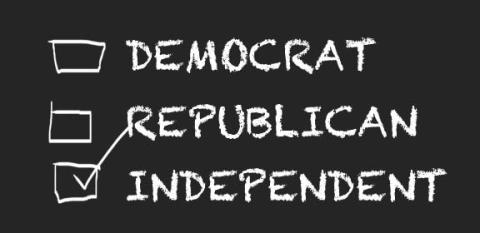If 2013 has taught us one thing about the American electorate, it's that independent-minded voters are the new norm in the political sphere.
Since 2008, the number of registered independents has risen by 2,484,104, representing an 11.19 percent increase. Meanwhile, support for both major parties is rapidly dropping, with less than 1 percent of new voters registering with either the Republican or Democratic party.
Despite their rising numbers, however, independent-minded voters are often excluded from the national dialogue. As 2013 comes to a close, we asked self-identified independent voters what issues mattered most this year.
Below are the top 10 responses:
As the first presidential election since the Citizens United ruling struck down limitations on corporate spending in elections, the 2012 election cycle set the record for the most expensive election in history. Costing over $6 billion, election money was almost exclusively spent to promote candidates of the two major parties, leaving independent-minded voters seriously rethinking campaign finance laws in America.
Over 90 percent of elections are decided during primaries, but because of restrictive elections laws only 10 percent of people participate. Furthermore, only 35 of 435 elections - 8 percent - are projected to be competitive in 2014 due to 200 years of gerrymandering.
Reforming the primary system and fair redistricting are just a few of the reforms important to independent voters, who are repeatedly excluded from the electoral process.
Just named Dictionary.com's word of the year, privacy is a top concern for all voters, regardless of party affiliation. Discussions of the NSA surveillance program and the privacy threats we face in an increasingly digital and social world dominated the public arena in 2013, with vague legal precedents leaving a multitude of unanswered questions for 2014.
Sixty-three percent of independent voters do not trust the mass media to present news accurately, fairly, and fully, according to a September 2013 Gallup study. Whether it is because of the biased lens through which news stations manipulate current events or the numerous bloopers and inaccuracies that define 2013 reporting, trusted information is scarce for independent thinkers.
It is a basic principle of democracy that once in office, representatives are accountable to the people, not the parties. Recently, however, party members have become beholden to their party leaders with little to no accountability to American voters. Restoring accountability requires weakening control that the two major parties have over the electoral process.
Despite President Obama's promise to fix the broken immigration system by the end of 2013, immigration reform still has not passed the House. With 73% of Americans in support of the Senate’s immigration reform bill, it will likely continue to be a hot topic for independent voters well into 2014 -- or until a compromise is met.
In 2013, the national debt topped $17 trillion for the first time ever. Is it any wonder that this is among the top concerns for independent voters nationwide?
When it comes to marijuana legalization, "the group which showed the largest increase in public support was independent voters, jumping from 50% to 62% support of legalization in just one year."
Is the problem a lack of independent-minded candidates, or are the rules rigged in favor of the two major parties?Partisanship is now the biggest problem facing America, Gallup concluded after partisan theatrics from both Republican and Democratic leaders shut down the government for 17 days straight. Concern with partisan politics is amplified among voters who look beyond party labels, making partisanship a top issue, or frustration, among independent voters in 2013.
